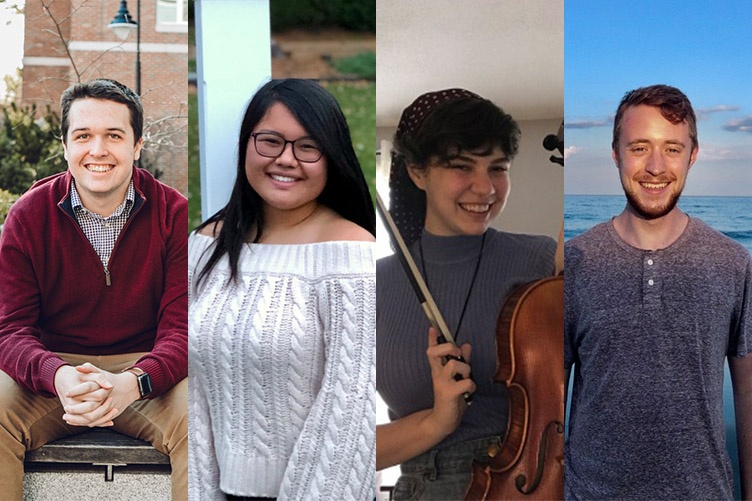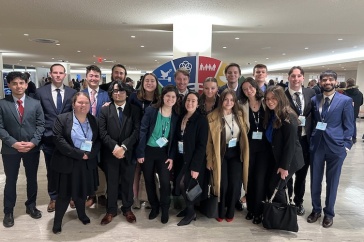
left to right: Ben Mackillop '23, Aliya Sarris '23, Kylie Smith '22 and Hayden Stinson '21
The annual issue of Inquiry is now available. The research journal offers articles and commentaries on undergraduate research from current and recently graduated UNH students. Four students with majors in the College of Liberal Arts are featured: political science major Ben Mackillop '23; Aliya Sarris '23, a triple major in political science, Spanish and women's and gender studies; music education major Kylie Smith '22; and linguistics major Hayden Stinson '21.
Why Is Our Politics So Polarized? The New Hampshire Political System and the Rural/Urban Split
Ben Mackillop '23 (political science major)
"During the summer of 2020, I had the opportunity to conduct research through the University of New Hampshire’s Research Experience and Apprenticeship Program (REAP) under faculty mentor Professor Dante Scala. In this commentary I give a brief introduction to the research I conducted on political polarization within the New Hampshire state legislature. I hypothesized that the rural/urban divide for New Hampshire citizens, and thus their state legislatures, is a key contributor to political polarization within state politics. I analyzed voting patterns on multiple, diverse bills from the 2019-2020 legislative session, comparing urban legislatures to their rural peers. I anticipated that rural state legislators would be more likely than urban legislators to vote against the majority opinion of their party if they felt it would help their constituents. I expected this to be especially the case on polarizing issues where different experiences between those in rural areas and those in urban areas affect their opinions. However, I found the opposite to be true. I then conducted multiple interviews with current state legislators to understand better why they behave the way they do. In closing, this commentary discusses political polarization as a broader idea and gives some insight into how polarization can improve."
LGBTQ+ Oral History: The Power of Community and Individual Stories
Aliya Sarris '23 (political science, Spanish and women's and gender studies majors)
"During the summer of 2020, I had the amazing opportunity to participate in the Research Experience and Apprenticeship Program (REAP) at the University of New Hampshire under the mentorship of Professor Holly Cashman. In this commentary, I explain the concept of oral history, a research method that entails the collection and study of recorded interviews with those who have personal experiences within the framework of larger historical events. The project specifically focused on the oral histories of older LGBTQ+ folks living in the Seacoast area of New Hampshire. The goal was to collect information regarding their experiences in New Hampshire both before and after the Stonewall Riot of 1969, known as a catalyst of the LGBTQ+ community’s activism. I discuss the experiences of three interviewees that include themes such as discovering community, exploring self-acceptance, and finding lost love. I also explain the concept and significance of researcher positionality, or the researcher’s relation to the social and/or political context of the project, in qualitative research. Through the oral history method, I was able to discover the importance of community engagement and the power of each interviewee’s individual story."
Refugee Composers of the Twentieth Century: The Impact of Displacement on Musical Identity During World War II
Kylie Smith '22 (music education major)
"Kurt Weill, Bela Bartok, and Arnold Schoenberg are all influential composers of the twentieth century who immigrated to the United States to escape persecution during World War II. Their refugee experience, however, is not often taken into account when studying their musical works. This project examines how their immigration affected their compositional output, and how the pressures of the time shaped them as composers. This project aims to bring light to an underappreciated factor of these composers' lives and inform the way we support refugee musicians in the future."
Sexuality and Regional Dialects in Southern New Hampshire
Hayden Stinson '21 (linguistics major)
"Social identity is complex and multifaceted. While census-like data has an important place in sociological research, everyone interacts with their social categorization uniquely. To bring this into focus in the field of linguistics, I conducted research on the relationship between regional dialects and gay identity. Using data from interviews that I conducted with two twenty-two-year-old gay men from southern New Hampshire, I followed in a line of research that focuses on the performative nature of social identity. I reached two particularly interesting findings. First, the participants used a “gayer-sounding” /s/ sound in a reading task than in a question-and-answer task. Second, the participants, both of whom grew up in and live in southern New Hampshire, used vowel patterns associated with New York City that aren’t associated with any group in southern New Hampshire. While the former is likely due to the association of gay-sounding speech with ideologies on proper speech and the second likely due to an idea that the participants would be safer expressing their gay identity in New York than they are in New Hampshire, both show that the expression of social identity is a complex, multi-layered phenomenon."
-
Compiled By:
Susan Dumais '88 '02G | College of Liberal Arts
















































